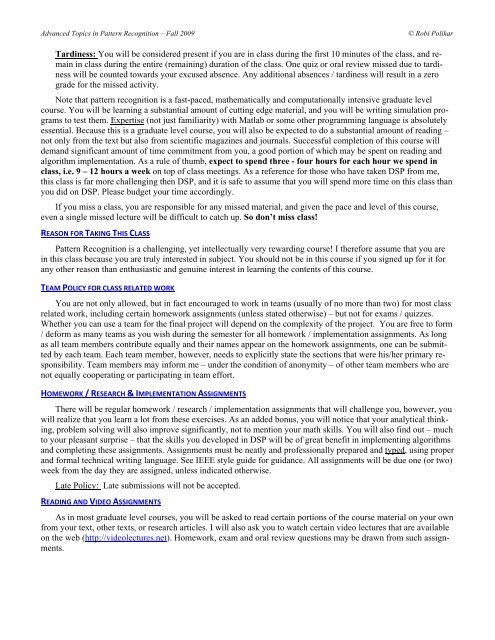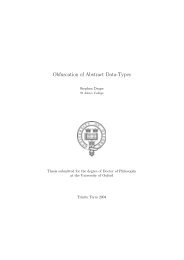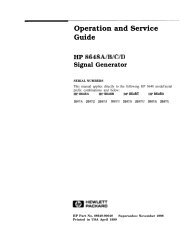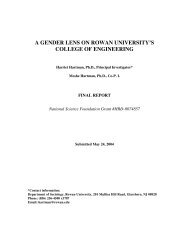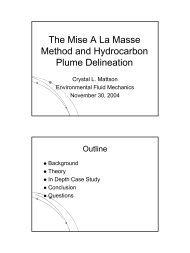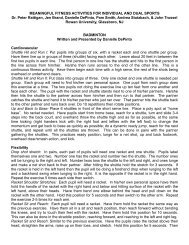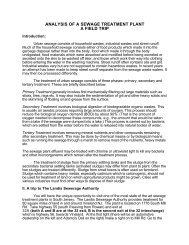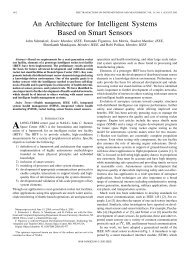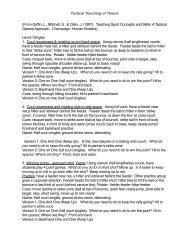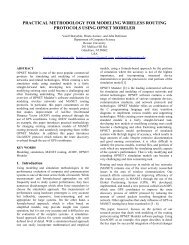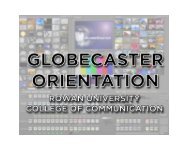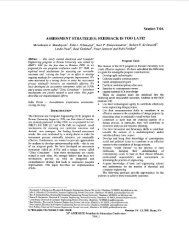Syllabus - ECE 504.04 Pattern Recognition - Rowan
Syllabus - ECE 504.04 Pattern Recognition - Rowan
Syllabus - ECE 504.04 Pattern Recognition - Rowan
Create successful ePaper yourself
Turn your PDF publications into a flip-book with our unique Google optimized e-Paper software.
Advanced Topics in <strong>Pattern</strong> <strong>Recognition</strong> – Fall 2009<br />
© Robi Polikar<br />
Tardiness: You will be considered present if you are in class during the first 10 minutes of the class, and remain<br />
in class during the entire (remaining) duration of the class. One quiz or oral review missed due to tardiness<br />
will be counted towards your excused absence. Any additional absences / tardiness will result in a zero<br />
grade for the missed activity.<br />
Note that pattern recognition is a fast-paced, mathematically and computationally intensive graduate level<br />
course. You will be learning a substantial amount of cutting edge material, and you will be writing simulation programs<br />
to test them. Expertise (not just familiarity) with Matlab or some other programming language is absolutely<br />
essential. Because this is a graduate level course, you will also be expected to do a substantial amount of reading –<br />
not only from the text but also from scientific magazines and journals. Successful completion of this course will<br />
demand significant amount of time commitment from you, a good portion of which may be spent on reading and<br />
algorithm implementation. As a rule of thumb, expect to spend three - four hours for each hour we spend in<br />
class, i.e. 9 – 12 hours a week on top of class meetings. As a reference for those who have taken DSP from me,<br />
this class is far more challenging then DSP, and it is safe to assume that you will spend more time on this class than<br />
you did on DSP. Please budget your time accordingly.<br />
If you miss a class, you are responsible for any missed material, and given the pace and level of this course,<br />
even a single missed lecture will be difficult to catch up. So don’t miss class!<br />
REASON FOR TAKING THIS CLASS<br />
<strong>Pattern</strong> <strong>Recognition</strong> is a challenging, yet intellectually very rewarding course! I therefore assume that you are<br />
in this class because you are truly interested in subject. You should not be in this course if you signed up for it for<br />
any other reason than enthusiastic and genuine interest in learning the contents of this course.<br />
TEAM POLICY FOR CLASS RELATED WORK<br />
You are not only allowed, but in fact encouraged to work in teams (usually of no more than two) for most class<br />
related work, including certain homework assignments (unless stated otherwise) – but not for exams / quizzes.<br />
Whether you can use a team for the final project will depend on the complexity of the project. You are free to form<br />
/ deform as many teams as you wish during the semester for all homework / implementation assignments. As long<br />
as all team members contribute equally and their names appear on the homework assignments, one can be submitted<br />
by each team. Each team member, however, needs to explicitly state the sections that were his/her primary responsibility.<br />
Team members may inform me – under the condition of anonymity – of other team members who are<br />
not equally cooperating or participating in team effort.<br />
HOMEWORK / RESEARCH & IMPLEMENTATION ASSIGNMENTS<br />
There will be regular homework / research / implementation assignments that will challenge you, however, you<br />
will realize that you learn a lot from these exercises. As an added bonus, you will notice that your analytical thinking,<br />
problem solving will also improve significantly, not to mention your math skills. You will also find out – much<br />
to your pleasant surprise – that the skills you developed in DSP will be of great benefit in implementing algorithms<br />
and completing these assignments. Assignments must be neatly and professionally prepared and typed, using proper<br />
and formal technical writing language. See IEEE style guide for guidance. All assignments will be due one (or two)<br />
week from the day they are assigned, unless indicated otherwise.<br />
Late Policy: Late submissions will not be accepted.<br />
READING AND VIDEO ASSIGNMENTS<br />
As in most graduate level courses, you will be asked to read certain portions of the course material on your own<br />
from your text, other texts, or research articles. I will also ask you to watch certain video lectures that are available<br />
on the web (http://videolectures.net). Homework, exam and oral review questions may be drawn from such assignments.


